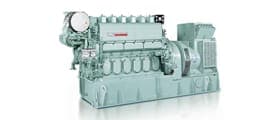เครื่องยนต์ทางทะเลที่ใช้เชื้อเพลิงไฮโดรเจนและการพัฒนา MHFSได้รับเลือกในโครงการ NEDO Green Innovation Fundเพื่อสร้างเรือที่ปล่อยมลพิษเป็นศูนย์
วิสัยทัศน์01 สังคมประหยัดพลังงาน
วัตถุประสงค์
การเพิ่มความเป็นไปได้ของพลังงาน ใช้พลังงานไฟฟ้าและความร้อนที่ไม่แพงและปลอดภัย เมื่อใดก็ได้และเท่าที่จำเป็นเท่านั้น
ผลิตภัณฑ์ บริการ และการสนับสนุนของเราสำหรับ วิสัยทัศน์01

ระบบการจัดการพลังงาน
เรามีส่วนร่วมในการเพิ่มประสิทธิภาพการใช้พลังงานทั่วทั้งโรงงานผ่านการวิเคราะห์ประสิทธิภาพการใช้เชื้อเพลิง และการวิเคราะห์สถานะการดำเนินงานด้านพลังงาน นี่คือวิธีที่เราช่วยให้บรรลุประสิทธิภาพการใช้พลังงาน

เครื่องยนต์ดีเซลสำหรับใช้ในอุตสาหกรรม
เราพัฒนาเครื่องยนต์กำลังสูงที่ประหยัดเชื้อเพลิงเป็นพิเศษเพื่อขยายกลุ่มเครื่องยนต์ดีเซลอุตสาหกรรมของเรา เครื่องยนต์เหล่านี้ยังเข้ากันได้กับมาตรฐาน European Stage V ล่าสุด
SDGs ที่สอดคล้องกัน

ความท้าทายทางสังคมที่ต้องแก้ไขที่เกี่ยวข้องกับ วิสัยทัศน์ 01

การมีส่วนร่วมในธุรกิจ
บริษัท ยันมาร์ เพาเวอร์เทคโนโลยี

ความท้าทาย
ทั่วโลกเริ่มตระหนักถึงการลดคาร์บอน การลดการปล่อยก๊าซเรือนกระจก ได้กลายเป็นประเด็นเร่งด่วนในการขนส่งระหว่างประเทศ ในเดือนตุลาคม พ.ศ. 2564 รัฐบาลญี่ปุ่นและอุตสาหกรรมการเดินเรือได้ประกาศเป้าหมายการปล่อยก๊าซเรือนกระจกจากการขนส่งระหว่างประเทศภายในปี พ.ศ. 2593 และองค์การการเดินเรือระหว่างประเทศซึ่งใช้กลยุทธ์ในปี พ.ศ. 2561 เพื่อลดการปล่อยก๊าซเรือนกระจกจากการขนส่งระหว่างประเทศอย่างน้อย 50% ภายในปี 2593 มีแผนจะแก้ไขและเสริมความแข็งแกร่งให้กับกลยุทธ์นี้ในปี 2566
- เอกสารอ้างอิง: เป้าหมายการปล่อยก๊าซเรือนกระจกให้เป็นศูนย์จากการขนส่งระหว่างประเทศภายในปี 2593 โครงการ Shipping Zero Emission
แนวทาง

องค์การพัฒนาเทคโนโลยีพลังงานและอุตสาหกรรมใหม่ NEDO เปิดตัวโครงการนี้เพื่อพัฒนาเรือเดินทะเลรุ่นใหม่ ในเดือนมกราคม 2022 เพื่อสร้างเรือที่ปล่อยมลพิษเป็นศูนย์ Yanmar Power Technology ร่วมมือกับ Kawasaki Heavy Industries และ Japan Engine Corporation, J-ENG เพื่อพัฒนาเครื่องยนต์เรือเดินทะเลที่ใช้เชื้อเพลิงไฮโดรเจนและ MHFS *1 และมีเป็นนโยบายหลักในโครงการนี้
ทั้งสามบริษัทมีส่วนร่วมในโครงการริเริ่มสำหรับเครื่องยนต์เรือที่ใช้เชื้อเพลิงไฮโดรเจน โดย Kawasaki พัฒนาเครื่องยนต์ 4 จังหวะความเร็วปานกลาง ยันม่าร์พัฒนาเครื่องยนต์ 4 จังหวะความเร็วปานกลางและความเร็วสูง *2 และ J-ENG พัฒนาความเร็วต่ำ 2 จังหวะ เราจะครอบคลุมกลุ่มเครื่องยนต์ที่สมบูรณ์ซึ่งสามารถใช้เพื่อตอบสนองความต้องการที่หลากหลายภายในปี 2569 และวางแผนที่จะดำเนินโครงการนำร่องบนเรือที่ดำเนินการร่วมกับบริษัทเดินเรือและอู่ต่อเรือ ซึ่งจะก่อให้เกิดประโยชน์ต่อสังคมและเศรษฐกิจ
Through joint investment in a newly established company, HyEng and with MHFS developed at Kawasaki, the three companies are working together to build a hydrogen-fueled propulsion system by developing common technical elements such as basic combustion analysis, materials and sealing surfaces that meet ship classification regulations, and sharing testing facilities.
- *1 MHFS: Marine Hydrogen Fuel System: hydrogen fuel marine tanks and fuel supply system
- *2 YPT กำลังวางแผนที่จะพัฒนาเครื่องยนต์ความเร็วปานกลางที่ใช้เชื้อเพลิงไฮโดรเจน ตามด้วยเครื่องยนต์ความเร็วสูงที่ใช้เชื้อเพลิงไฮโดรเจน
Swipe to see the right side of this picture.

- Source: Kawasaki Heavy Industries, Yanmar Power Technology, Japan Engine Corporation
สิ่งที่ได้รับ
Through hydrogen-fueled engines, we will contribute to the reduction of GHG emissions in a wide range of applications, with ocean-going vessels as the main focus, and also domestic vessels. In addition, we will provide a hydrogen-fueled engine system that ensures the necessary redundancy for ships, saves space in the engine room, and satisfies NOX and SOX regulations. The project will also help the revitalization of the domestic maritime industry.
ระบบพลังงานยันม่าร์

Contributing to the realization of a carbon-free society 100% hydrogen-fueled cogeneration manufactured by German company 2G to be sold in Japan and overseas by the end of FY 2022.
ความท้าทาย
The pursuit of energy efficiency and the use of renewable energy to reduce greenhouse gas emissions are essential to achieve a carbon-free society. Wind power generation and solar power generation are also spreading in Japan, but the fluctuation of energy production remains a challenge, due to the characteristics of dealing with nature. Therefore, expectations are high for hydrogen as a new energy source. Hydrogen energy can be produced from various energy sources, including renewable energy, and has the advantage of not emitting CO2 when used. Businesses are increasingly focusing on this as a medium- to long-term key to achieving carbon neutrality.
แนวทาง
Yanmar Energy System has concluded a sales agreement for the 100% hydrogen-fueled cogeneration system manufactured by the German company 2G Energietechnik GmbH. The agreement is for Asia, including Japan, the Middle East, and Africa, and the system will be used in Japan within this fiscal year. We plan to handle a total of 5 models* with a power generation capacity of 115 kW to 750 kW.
By November 2022, the machine will be installed at Yanmar Energy System’s Okayama Test Center for validation of construction and maintainability. In 2023, we will also open a facility where customers can see the actual product, and propose this system as a solution that includes hydrogen supply for various environmentally friendly projects and companies. We will also promote technological development so that gas engines made by Yanmar are also compatible with hydrogen fuel.
In the future, we will continue to propose total energy solutions, including CHP and hydrogen generators, and strengthen our initiatives to solve our customers’ energy challenges and realize a carbon-free society.
- * Depending on the results of the test, the models and actual figures may change.


สิ่งที่ได้รับ
By promoting hydrogen-fueled cogeneration systems that generate electricity and heat efficiently, businesses can curb the amount of fossil fuels and grid electricity in their business activities, thereby contributing to a decarbonized society.

 การเกษตร
การเกษตร
 แทรกเตอร์
แทรกเตอร์
 อุปกรณ์ต่อพ่วง
อุปกรณ์ต่อพ่วง
 รถเกี่ยวนวดข้าว
รถเกี่ยวนวดข้าว
 รถดำนา
รถดำนา
 รถตัดอ้อย
รถตัดอ้อย
 รถไถนาเดินตาม
รถไถนาเดินตาม
 การเดินทะเลโดยสาร
การเดินทะเลโดยสาร
 การเดินทะเลเชิงพาณิชย์
การเดินทะเลเชิงพาณิชย์
 เผลิตภัณฑ์ไฟฟ้าขนาดกะทัดรัด
เผลิตภัณฑ์ไฟฟ้าขนาดกะทัดรัด
 สำหรับการก่อสร้าง
สำหรับการก่อสร้าง
 รถขุด
รถขุด
 อุปกรณ์
อุปกรณ์
 เครื่องยนต์เพื่อการอุตสาหกรรม
เครื่องยนต์เพื่อการอุตสาหกรรม
 ระบบพลังงาน
ระบบพลังงาน
 การผลิตไฟฟ้า
การผลิตไฟฟ้า
